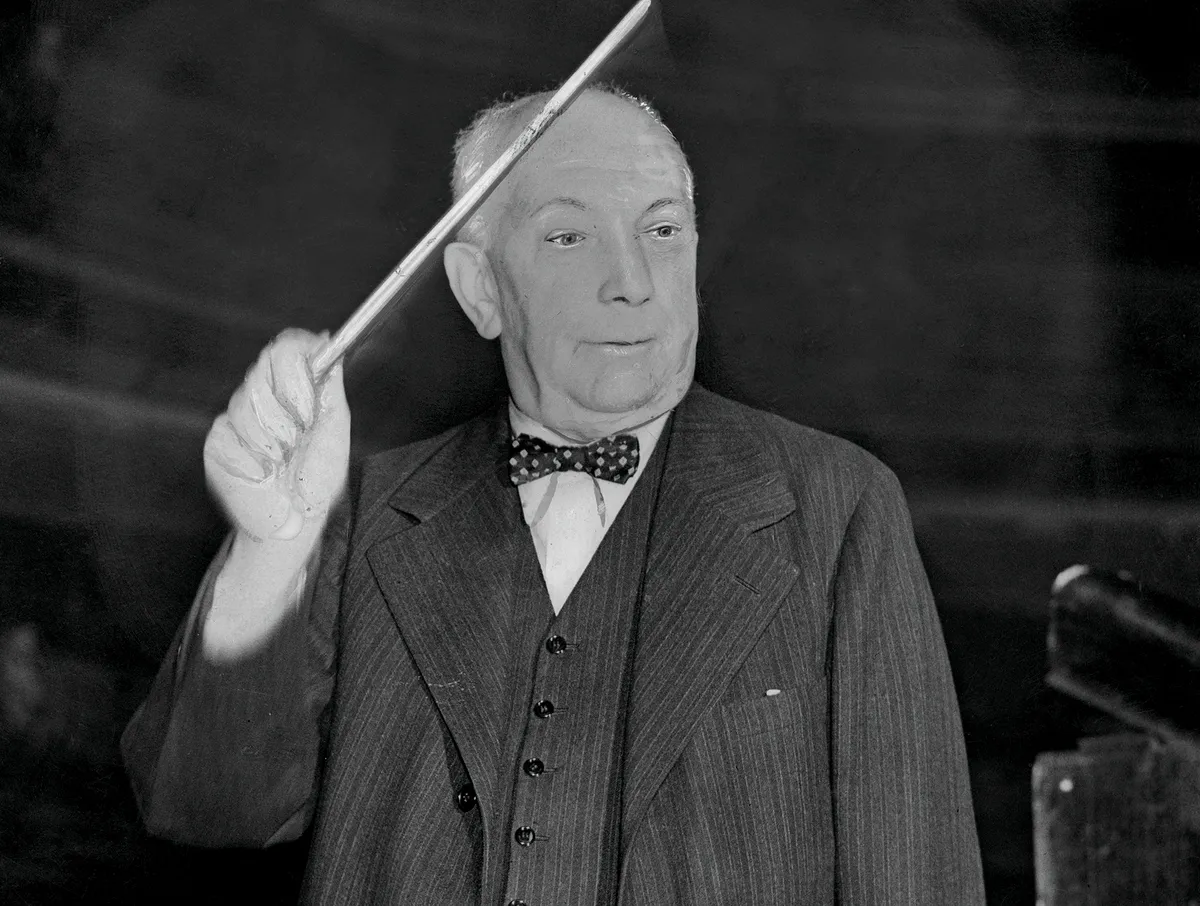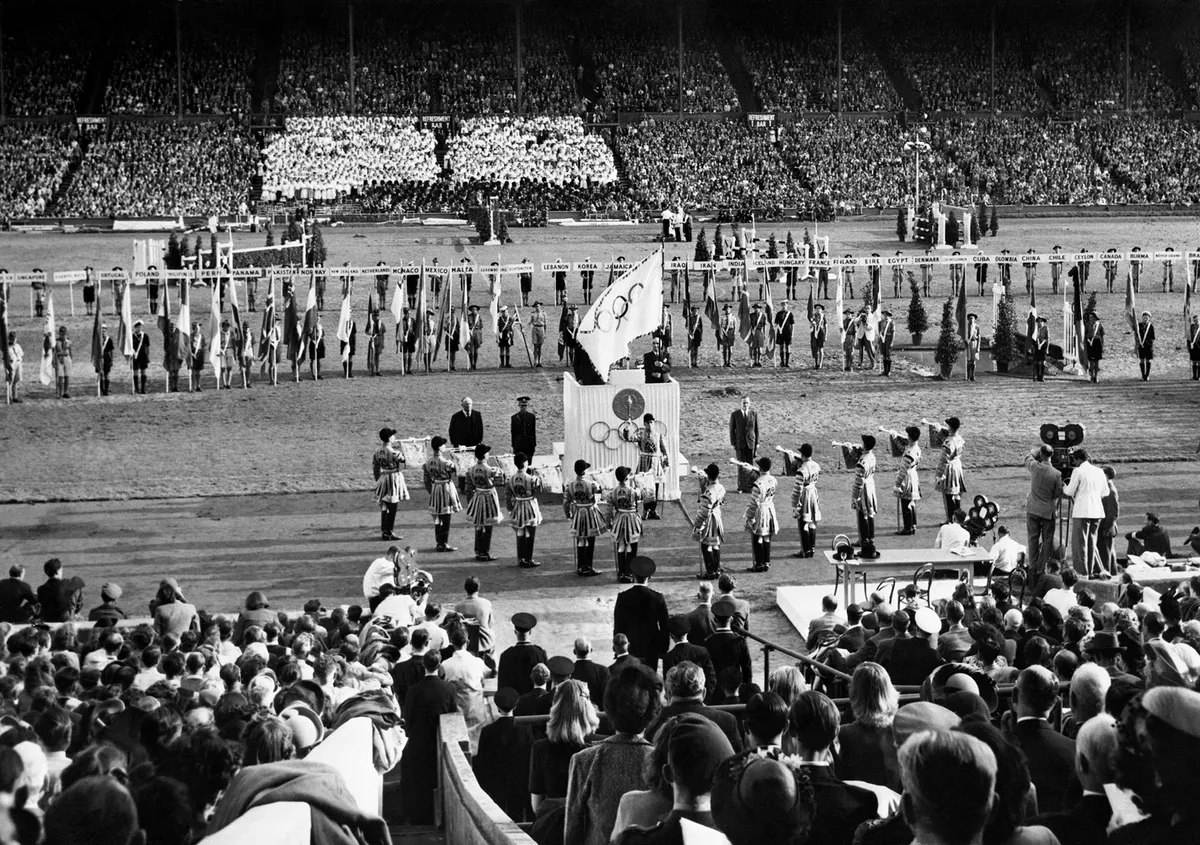At the Olympic Games, music has always played a key role in adding to the atmosphere of celebration and sporting endeavour. Here are a few of the key moments when music has been front and centre stage at the Olympics.
Music in the early days of the Olympic Games
The opening ceremony has been described as the unofficial first gold medal of the Olympics. This fact would have pleased Baron Pierre de Coubertin, the music-loving Frenchman who revived the games back in the 1890s.
He wanted to recapture the spirit of the Ancient Games in Olympia and convened a meeting at the Sorbonne in Paris in 1894 to discuss their revival. ‘It was as if I had collected around me a small orchestra that was awaiting the signal to start, without knowing exactly what tune it was to play,’ he wrote, in suitably tuneful style.
Those at the meeting heard the first choral performance of the ancient ‘Hymn to Apollo’, newly discovered in Delphi and set to music by Fauré. Suitably inspired, they agreed to organise the first modern Olympic Games in Athens two years later.
Music at the 1896 Olympic Games
For those first Games, there were no Olympic rings, nor was there a flame, but there was music. Organisers commissioned Spyridon Samaras from Corfu to write a cantata for the occasion, paying him 5,000 drachmas. Greek poet Kostis Palamas added words ‘to give life to noble Games’.
The trick seems to have worked. ‘The composition of Mr Samaras created an immense sensation, and was applauded as it deserved,’ wrote the official report about the cantata’s performance, conducted by Samaras himself.
‘The melody is slow and soft at the commencement, becomes gradually more lively, and ends in a triumphant crescendo swelled by all the voices and every instrument in the orchestra. Frenetic applause resounded from every part of the Stadion at the conclusion of this hymn, its repetition was unanimously demanded, [and] the King himself expressed his warm approval by applauding vigorously.’
Despite this early acclaim, the cantata was not used again at an opening ceremony for nearly 50 years. Samaras, meanwhile, would use the fanfare as the overture in his opera Rhea, a tragic tale of a mythological Olympic Games, which premiered shortly before the 1908 Games in London.
The opera was later believed lost after a wartime bombing raid destroyed the music publishing house which stored the scores. In fact, only patient research by Greek conductor Byron Fidetzis pieced it together in time for the 2004 Athens Games, when it was performed at the cultural festival.
When did the Cultural Olympiad begin?
Coubertin himself wanted ceremonies which would set the Olympics apart from ‘mere world championships’, but was disappointed by London’s efforts in 1908. ‘I am continually astonished at the lack of interest shown in the idea of combining sports meetings and open air choral performances,’ he complained. ‘How much more perfect the whole effect would have been if there had been one of those mass choirs which excel in England performing the incomparable cantatas of Handel?’
Thankfully, the 1912 Games in Stockholm were more to his liking. There, artistic contests made it possible to win gold for poetry, painting, musical composition and architectural design. These remained part of the Games until 1948, and the idea lives on today in the cultural Olympiad.
Coubertin, who died in 1937, would go on to witness five more summer games – in Antwerp (1920), Paris (1924), Amsterdam (1928), Los Angeles (1932) and, infamously, Berlin (1936).
Music at the 1936 Berlin Olympic Games: Strauss and Hitler

Berlin had been awarded the 1936 Olympics before Hitler became chancellor, and he had been a fierce opponent of the Games. Once in power, however, he changed his tune: spectacular ceremonies were demanded and Richard Strauss, no less, was told to compose the Olympic hymn.
Strauss was less than impressed. ‘I kill the boredom of the Advent hours by writing an Olympic hymn for the proles,’ he scribbled to novelist friend Stefan Zweig. ‘I of all people who hate and despise sports.’
His words reached Theodor Lewald, president of the Olympic organising committee. ‘Your letter shocked me,’ Lewald retorted. ‘You compare the Olympic stadium to a recreation ground and refer to our festival as an amateur orgy.’
Strauss did not attend the 1936 Winter Olympics, even though they took place in Garmisch-Partenkirchen where he lived. He did, however, go to Berlin to conduct his work at the Olympic opening ceremony. Moreover, it is said that the only time he ever visited a cinema was to see Olympia, Leni Riefenstahl’s 1938 documentary film which featured his music. As the Berlin Games ended, searchlights reached towards the sky at the closing ceremony: an eerie portent of things to come.
London 1948 - post war politics

When, after World War 2, the Games resumed in London in 1948, Germany and Japan were not invited. Nor were organisers of the Olympic Games keen to use music by Strauss, even though his had been designated as the ‘Olympic hymn for all time’.
Instead, conductor Sir Malcolm Sargent, who had been appointed Olympic director of music, remembered the 1934 Pageant of Parliament where he had performed Roger Quilter’s hymn Non Nobis Domine with words by Rudyard Kipling. He felt that it was as stirring as Jerusalem, the venerable hymn by Hubert Parry that sets words by William Blake to music. The committee agreed.
Wembley sweltered as Sargent strode out to conduct the Royal Choral Society, the BBC Choral Society and choirs of the City of Westminster, Wembley, Harrow and the National Provincial Bank plus the bands of the Brigade of Guards in Quilter’s hymn and the ‘Hallelujah’ Chorus from the Messiah.
And so, 40 years after Coubertin’s complaint, his dream of massed English choirs singing Handel was realised. When it was over, somebody asked Sargent what it was like to conduct such a vast crowd. ‘Like taking a jellyfish for a walk on an elastic lead,’ came the reply.
The Olympic Games hymn: music written for the Games
Olympic organisers in Helsinki ran a nationwide competition to find music for the 1952 Games – won by composer Jaakko Linjama – but the quest for the Olympic movement’s own music remained a bugbear. And so, in 1954 Prince Pierre of Monaco announced a competition with a first prize of 1,000 US dollars.
The requirement was for a three-to-four minute hymn, setting words by Pindar, which would be judged by a panel including cellist Pablo Casals and composers Nadia Boulanger, Aaron Copland, Frank Martin and Lennox Berkeley (Shostakovich was invited but didn’t respond).
- Pablo Casals features in our list of the 20 greatest cellists of all time
Before long, the IOC had received nearly 400 entries, from which a composition by Michael Spisak, a Pole resident in Paris, was chosen. ‘It is a virile and touching prayer and I seriously consider it an important work capable of imposing itself on the memory of the crowds,’ was Prince Pierre’s verdict.
The work was performed at the 1956 Melbourne Olympics, but there was a hitch – Spisak had retained copyright and demanded performance fees, which angered the IOC. Not even their forceful president Avery Brundage could make him change his mind.
When was the Olympic Hymn first performed?
The solution finally came in 1958 at an IOC meeting in Tokyo, when Japanese organiser Ryotaro Azuma arranged for a performance of Samaras’s 1896 hymn. The result? Now known as the Olympic Hymn, it was played at the 1960 Olympics in Squaw Valley, California. And it has been played at every opening and closing ceremony since, performed as the Olympic flag is raised above the stadium.
For all Coubertin’s wishes, however, Olympic opening ceremonies remained relatively low key, and music at the Olympic Games was not centre stage. That all changed with Moscow in 1980.
The chimes of the Kremlin clock in Red Square were relayed by loudspeaker, then the third movement of Tchaikovsky’s Pathétique Symphony resounded around the Lenin Stadium as charioteers entered. With balletic set pieces, the show drew on the vast Russian musical heritage. By any measure, it was the most spectacular opening yet.
Los Angeles 1984 - the birth of the big-name performers and large-scale performances
But then came Los Angeles. The Americans had boycotted Moscow over the Soviet invasion of Afghanistan, so the 1984 opening ceremony was always going to be an exercise in one-upmanship. Eighty-four grand pianos joined forces for Gershwin’s Rhapsody in Blue before The Olympian by Philip Glass accompanied veteran decathlete Rafer Johnson as he lit giant Olympic rings to ignite the cauldron. Star Wars composer John Williams (one of the best film composers in the world) also felt the Olympic force, composing music for Los Angeles, as he would also go on to do for Atlanta (1996) and the Salt Lake City (2002) Winter Games.
The era of big-name performers and large-scale performances was now with us. At the 1992 Games in Barcelona – memorably heralded on the BBC’s coverage by Montserrat Caballé and Freddie Mercury’s operatic collaboration – the memory of the ‘Three Tenors’ at the 1990 World Cup was still fresh, so Spanish tenors Alfredo Kraus and Plácido Domingo both sang at the ceremonies.
So did Catalonia’s own José Carreras, who performed ‘Amigos Para Siempre’, the official song of the Games, with Sarah Brightman. (Sadly, when the third of the Three Tenors got to enjoy his Olympic moment 14 years later, he didn’t sing a note – ill health meant that Luciano Pavarotti had to lip-sync ‘Nessun Dorma’ at the grand finale to the 2006 Winter Games in Turin.)
- Luciano Pavarotti: the best recordings
- How Puccini's Madam Butterfly catapulted Pavarotti to stardom
1996 to the present day
Specially composed music has always been part of the Olympic mix – not least Mark Watters’s Citius, Altius, Fortius, as sung by soprano Jessye Norman at the Centennial Games in Atlanta – but the greats of the past have been accorded their rightful place, too. In those same 1996 games, the cauldron was lit by Muhammad Ali to the sound of Beethoven’s ‘Ode to Joy’.
That work has often been heard in an Olympic setting. Never so memorably, surely, as ‘The performance of the world’ at the 1998 Winter Games in Nagano, where Seiji Ozawa conducted choirs in Beijing, Berlin, Sydney, New York and Cape Town, all linked by satellite.
At Sydney 2000, meanwhile, the ‘Tibi omnes’ from Berlioz’s Te Deum was the soundtrack as Cathy Freeman stooped to light the Olympic fire – the performance proving only just long enough, as a technical malfunction delayed the raising of the cauldron to its final position.
Getting Olympic fever? Make sure you know the lyrics to the various national anthems so you can sing along at the medal ceremonies